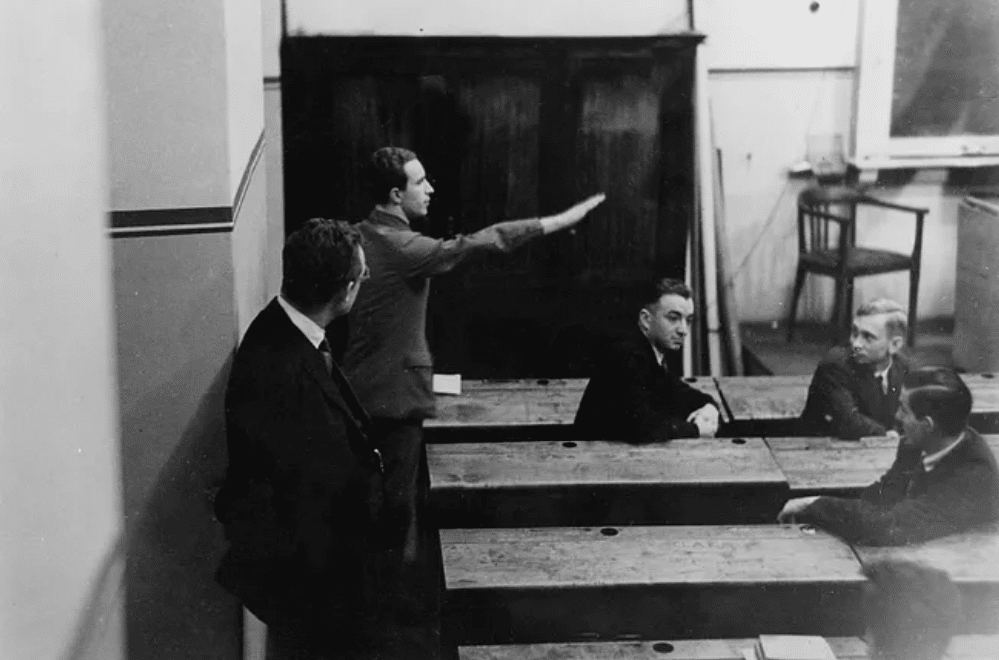In 1927 the French philosopher Julien Benda published La trahison des clercs—“The Treason of the Intellectuals”—which condemned the descent of European intellectuals into extreme nationalism and racism. By that point, although Benito Mussolini had been in power in Italy for five years, Adolf Hitler was still six years away from power in Germany and 13 years away from victory over France. But already Benda could see the pernicious role that many European academics were playing in politics.
Those who were meant to pursue the life of the mind, he wrote, had ushered in “the age of the intellectual organization of political hatreds.” And those hatreds were already moving from the realm of the ideas into the realm of violence—with results that would be catastrophic for all of Europe.
[The Free Press Report continues]
Such arguments fell apart after October 7, as the response of “radical” students and professors to the Hamas atrocities against Israel revealed the realities of contemporary campus life. That hostility to Israeli policy in Gaza regularly slides into antisemitism is now impossible to deny.
I cannot stop thinking of the son of a Jewish friend of mine, who is a graduate student at one of the Ivy League colleges. Just this week, he went to the desk assigned to him to find, carefully placed under his computer keyboard, a note with the words “ZIONIST KIKE!!!” in red and green letters.
Just as disturbing as such incidents—and there are too many to recount—has been the dismally confused responses of university leaders.
Testifying before the House Committee on Education and the Workforce last week, Harvard President Claudine Gay, MIT President Sally Kornbluth, and University of Pennsylvania President Elizabeth Magill showed that they had been well-briefed by the lawyers their universities retain for such occasions.
[The Free Press Report continues]
The killing of George Floyd happened when Gay was dean. Six days after Floyd’s death, she published a statement on the subject that suggests she felt personally threatened by events in distant Minneapolis. Floyd’s death, she wrote, illustrated “the brutality of racist violence in this country” and gave her an “acute sense of vulnerability.” She was “reminded, again, how even our [i.e., black Americans’] most mundane activities, like running. . . can carry inordinate risk. At a moment when all I want to do is gather my teenage son into my arms, I am painfully aware of how little shelter that provides.” In nothing that Gay said last Tuesday did she seem aware that Jewish students might have felt the same way after October 7.
In a memorandum to faculty on August 20, 2020, she wrote: “The calls for racial justice heard on our streets also echo on our campus, as we reckon with our individual and institutional shortcomings and with our Faculty’s shared responsibility to bring truth to bear on the pernicious effects of structural inequality.” Gay continued: “This moment offers a profound opportunity for institutional change that should not and cannot be squandered. . . . I write today to share my personal commitment to this transformational project and the first steps the FAS will take to advance this important agenda in the coming year.”
[The Free Press Report continues]
Yet the German professoriat had a fatal weakness. For reasons that may be traced back to the foundation of the Bismarckian Reich or perhaps even further into Prussian history, academically educated Germans were unusually ready to prostrate themselves before a charismatic leader, in the belief that only such a leader could preserve the purity of the German nationalist project.
Today’s progressives engage in racism in the name of diversity. The nationalist academics of interwar Germany were at least overt about their desire for homogeneity and exclusion.
Marianne Weber recalled how, in the wake of the 1918 Revolution, her husband Max had explained his theory of democracy to the former supreme military commander, General Erich Ludendorff:
Weber: Do you think that I regard the Schweinerei that we now have as democracy?
Ludendorff: What is your idea of a democracy, then?
Weber: In a democracy, the people choose a leader whom they trust. Then the chosen man says, “Now shut your mouths and obey me.” The people and the parties are no longer free to interfere in the leader’s business.
Ludendorff: I should like such a “democracy.”
Weber: Later, the people can sit in judgment. If the leader has made mistakes—to the gallows with him!
Rudy Koshar’s study of the university town of Marburg in Hesse illustrates the way this culture led German academia toward the Nazis. The mainly Protestant student fraternities already excluded Jews from membership before World War I. In March 1920, in the turbulent aftermath of the revolution that had overthrown the imperial regime and established the Weimar Republic, a student paramilitary group was involved in a murderous attack on Communist workers. In the national elections held four years later, the Völkisch-Sozialer Bloc—of which the early Nazi Party (the NSDAP) was a key part—won 17.7 percent of the Marburg vote.
[The Free Press Report continues]
A critical factor in the decline and fall of the German universities was precisely that so many senior academics were Jews. For some, Hitler’s antisemitism was therefore—not unlike woke intersectionality in our own time—a career opportunity.
For German academics of Jewish heritage, particularly those who had married gentiles and converted to Christianity, it was disorienting.
The case of Victor Klemperer, a convert to Christianity married to a gentile, is illustrative. A veteran of World War I, Klemperer was appointed Professor of Romance Languages and Literature at Dresden University of Technology in 1920. “I am nothing but a German or German European,” Klemperer wrote in his diary, one of the most illuminating testaments of the German Jewish nightmare. Throughout the 1930s, he maintained that it was the Nazis who were “un-German.” “I. . . feel shame for Germany,” he wrote after Hitler had come to power. “I have truly always felt German.”
Yet the atmosphere at German universities grew steadily more toxic even for the most assimilated of Jews.
In April 1933, under the Law for the Restoration of the Professional Civil Service, all Jewish civil servants, including judges, were removed from office, followed a month later by university lecturers. Klemperer recorded his agonized reaction in his diary:
March 10, 1933. . . . It is astounding how easily everything collapses. . . wild prohibitions and acts of violence. And with it, on streets and radio, never-ending propaganda. On Saturday. . . I heard a part of Hitler’s speech in Königsberg [the East Prussian university at which Immanuel Kant had spent his life]. . . I understood only a few words. But the tone! The unctuous bawling, truly bawling. . . . How long will I retain my professorship?
Klemperer managed to hang on to his chair for another two years. On May 2, 1935, however, the blow fell:
On Tuesday morning, without any previous notification—two sheets delivered by post. “On the basis of para 6 of the Law for the Restoration of the Professional Civil Service I have. . . recommended your dismissal.”. . . At first, I felt alternately dumb and slightly romantic; now there is only bitterness and wretchedness.
Five months later, to add insult to injury, he was barred from the university library reading room “as a non-Aryan.” What followed was a kind of relentless whittling away of his rights as a citizen.
[The Free Press Report continues]
He remained in Dresden after the occupation of eastern Germany. It was not long before he began to notice resemblances between the language of the new Soviet-backed German Democratic Republic and the Third Reich. Like Hannah Arendt and George Orwell, Klemperer understood that the totalitarianism of the right and the totalitarianism of the left had fundamentally similar characteristics. In particular, they loved to impose Newspeak on those they subjugated.
Non-Jewish German academia did not just follow Hitler down the path to hell. It led the way. A few examples will suffice.
SS Oberführer Konrad Meyer, a professor of agronomy at the University of Berlin, was one of the experts who helped devise Heinrich Himmler’s “General Plan East” (Generalplan Ost) which, in the expectation of victory over the Soviet Union, was supposed to extend German settlement as far as Archangel in the north and Astrakhan in the south. Meyer’s version proposed establishing three vast “marcher settlements” with around five million German settlers. The fate of the peoples currently living there would be either annihilation or ethnic cleansing.
[The Free Press Report continues]
The lesson of German history for American academia should by now be clear. In Germany, to use the legalistic language of 2023, “speech crossed into conduct.” The “final solution of the Jewish question” began as speech—to be precise, it began as lectures and monographs and scholarly articles. It began in the songs of student fraternities. With extraordinary speed after 1933, however, it crossed into conduct: first, systematic pseudo-legal discrimination and ultimately, a program of technocratic genocide.
The Holocaust remains an exceptional historical crime—distinct from other acts of organized lethal violence directed against other minorities—precisely because it was perpetrated by a highly sophisticated nation-state that had within its borders the world’s finest universities. That is why American universities cannot regard antisemitism as just another expression of “hate,” no different from, say, Islamophobia—a neologism that should not be mentioned in the same breath. That is why Claudine Gay’s double standards—with their implication that African Americans are somehow more deserving of protection than Jews—are so indefensible.
That is why rational minds recoil from her argument that antisemitism on the Harvard campus is tolerable so long as genocide is not being perpetrated.
[The Free Press Report continues]
Niall Ferguson is a trustee of the University of Austin, as well as Milbank Family Senior Fellow at the Hoover Institution, Stanford. He is the author of, among many works, The War of the World: History’s Age of Hatred (Penguin).
View this Free Press Report

